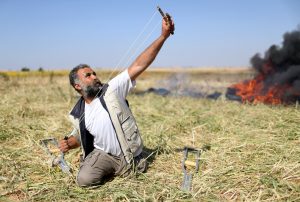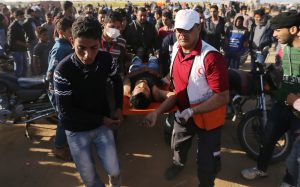
By Andreas Burger
KARLSRUHE, Germany (Reuters) – German police detained six men on Monday suspected of forming a far-right militant organization which assaulted foreigners in the eastern city of Chemnitz and planning attacks on politicians and civil servants, the GBA federal prosecutor’s office said.
Some 100 police officers backed by special commando units detained the six suspects aged 20 to 30 at locations in Germany’s Saxony and Bavaria states. Authorities also revealed that another suspect had been taken into custody on Sept. 14.
The men are accused of forming “Revolution Chemnitz”, an organization named after the city where the fatal stabbing of a German man blamed on migrants in August prompted the worst far-right violence in Germany in decades.
“Based on the information we have so far, the suspects belong to the hooligan, skinhead and neo-Nazi scene in the area of Chemnitz and considered themselves leading figures in the right-wing extremist scene in Saxony,” prosecutors said.
The group had planned to attack senior civil servants and politicians, they said.
“In the course of further investigations we encountered tangible indications that the organization pursued terrorist goals,” the GBA said in a statement.
GBA spokeswoman Frauke Koehler told reporters that the authorities had intercepted communications which showed that the suspects were plotting attacks against political opponents as well as foreigners.
Five of the suspects had attacked and injured foreigners in Chemnitz on Sept. 14 using glass bottles, steel knuckle gloves and tasers, the GBA statement said. The group had planned to carry out another attack on Oct. 3, the national holiday that marks the reunification of East and West Germany in 1991.
SKINHEADS
The violence in Chemnitz, where skinheads hounded migrants and performed the illegal Hitler salute, exposed deep divisions over Chancellor Angela Merkel’s decision in 2015 to welcome almost one million mostly Muslim asylum seekers.
The events also strained Merkel’s coalition government. Her conservatives and their Social Democrat (SPD) coalition partners could not agree what to do with the head of the BfV domestic spy agency, who questioned the authenticity of a video showing skinheads chasing migrants. They reached a compromise last month to transfer him to the interior ministry, ending a row that almost felled their six-month-old government.
The events in Chemnitz also raised questions about whether authorities in Saxony were too complacent in the face of rising far-right violence and xenophobia, in a country sensitive to whether the lessons of its Nazi past have been learned.
The reputation of Germany’s law enforcement was hurt by the handling of case of a neo-Nazi gang that murdered 10 people during a 2000-2007 campaign of racially motivated violence. Two members of the group, the National Socialist Underground (NSU), killed themselves in 2011 when police discovered the gang by chance. Another member was jailed for life in July.
The Sueddeutsche Zeitung newspaper said investigators believed “Revolution Chemnitz” would have carried out more murders than the NSU.
Interior Minister Horst Seehofer said after the arrests on Monday that the threat of a militant attack in Germany remains high, which means “an attack could take place any moment.”
(Writing by Joseph Nasr, Editing by Raissa Kasolowsky, William Maclean)




